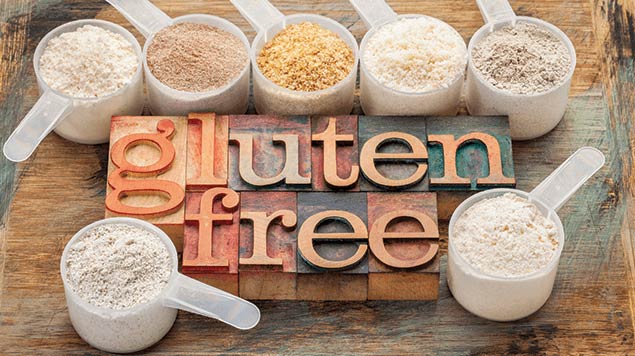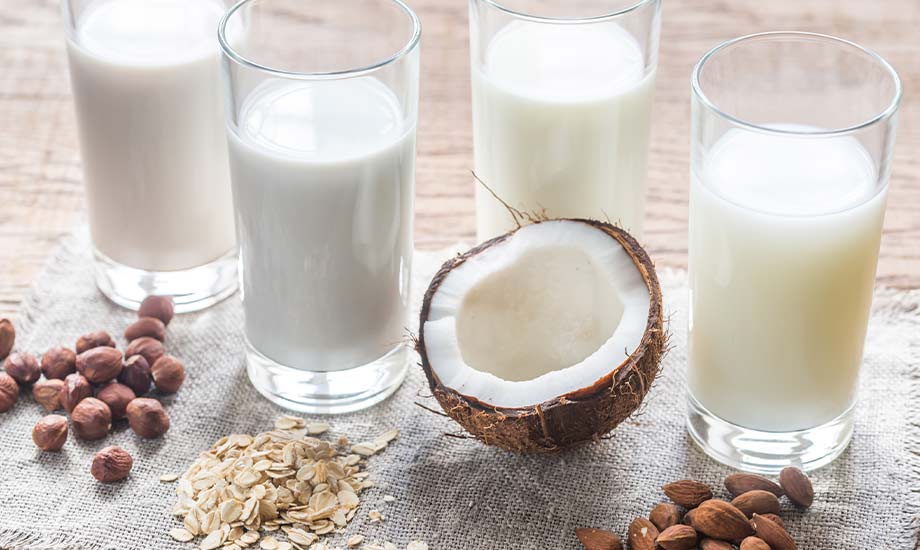In 2019, research showed that Americans over the age of 18 drank on average about 2.7 cups of coffee a day with the standard cup size being nine ounces! Add to this the fact that there’s a growing trend of people opting to follow a vegan lifestyle and you’ll soon see why finding a plant-based alternative to traditional cow’s milk is a priority.
Although the various types of cow’s milk taste much the same, plant-based milks taste quite different depending on the variety that you choose. In addition, some vegan milks curdle when mixed with coffee but taste absolutely delicious with cereal.
So, with coffee being so important and vegan milk substitutes being a little different to dairy, we’ve sampled a number of plant-based products and come up with our 6 favorites for you to try next time you grab a cuppa joe!
Coconut Milk
The first on our list is coconut milk. Grown in areas where there is a lot of water – such as the Philippines, Sri Lanka and the tropics – coconuts have a fairly low environmental impact as they need relatively low amounts of fertilizer and pesticide.
Coconut milk mixes extremely well into coffee and gives your brew a certain sweetness, which means that you don’t have to add any sugar. This decreases the calorie content so it’s ideal for those watching their weight.
In terms of nutritional value, coconut is high in saturated fats at three grams per cup. It doesn’t contain any protein but is high in vitamins A, B12 and E. If you want to boost your immune system, lessen your stress levels, or need more antioxidants, coconut milk is for you!
Macadamia Milk
As opposed to other nut milks that curdle when you put them in coffee, macadamia milk mixes in perfectly and adds in a hint of sweetness.
Most of the world’s macadamias originate from Australia, which often experiences droughts, so they could need quite a lot of irrigation depending on the state of the climate. The more water they need, the more an environmental impact macadamia have. Those concerned about the environment will want to think about this.
Nutrition-wise, macadamia milk contains five grams of fat per cup. However, unlike coconut milk, these are monounsaturated fats which are – together with polyunsaturated fats – seen as healthy fats. Monounsaturated fats can assist with reducing your LDL cholesterol (the bad cholesterol) which as a result, reduces your risk for heart attacks and stroke.
Cashew Milk
Like macadamia milk, cashew also mixes in smoothly and has a wonderful creamy texture. The slightly sweet taste is also appealing, and the fact that it’s less nutty makes it a favorite too.
This milk does come with quite a few downsides though, both environmentally and in how it can develop a soapy texture when steamed. In terms of going green, cashews are low yield crops, so they require a lot of natural resources to grow. This means they have a high environmental impact, so if you’re looking to reduce this by embracing a plant-based diet, make sure you opt for sustainably crafted cashew milk.
This option is also higher in fat and one cup contains two grams of fat, 25 calories and one gram each of carbs and protein.
Oat Milk
This type of milk is another variety that does well in coffee because of its rich texture. In fact, it’s favored by baristas for drinks such as lattes and cappuccinos as it adds that extra creaminess. However, people who are gluten intolerant should watch out for this option as oats are not gluten-free.
Oat milk has the lowest environmental impact as oats are largely rain-fed and have lower carbon emissions. Although it is slightly higher in sugar, it’s the highest vegan milk alternative in terms of fiber and gives you between three and four grams of protein per cup.
Soy Milk
Soy milk has been a popular option for many years and it’s a relatively cheap and easily accessible alternative to real dairy. The only problem is that it can curdle in coffee, and it’s very thin, so it may taste creamy, but the consistency is anything but. However, a good barista can make it froth, and its neutral taste is a big plus with many caffeine drinkers who prefer their coffee without any other flavourings.
In its favour is that it has a low environmental impact and it’s made by grinding soybeans and then boiling the mixture. Essentially, it’s a by-product of the beans that could otherwise go to waste.
With just four gram of fat per cup, soy milk is perfect for those who are weight conscious or looking for a diet option that’s low in calories and sugar.
Hemp Milk
With its slightly vegetal or nutty taste, hemp milk has become popular due to its high protein content and low environmental impact. Although this milk has a thin texture, it steams well due to its high protein content, so it’s perfect for a cappuccino.
From December 2018 growing hemp in the USA for commercial purposes has been legalized, so this type of plant-based alternative has gained a larger following. While the plant may contain THC, the resultant milk doesn’t, so there won’t be any psychoactive effects when added to a brew.
What’s interesting is that hemp milk may be plant-based, but it has much the same fat as cow’s milk. One cup of unsweetened hemp milk equals five grams of fat, but it has less protein, carbs and calories than its dairy alternative.
There are other plant-based milk alternatives that you can try, such as rice and pea, however they don’t provide the same coffee experience that you’d expect with your cream or half and half milk.
The next time you’re in the break room or at your favorite coffee shop, why not try out one of the plant-based milks that we’ve listed above? Exploration is exciting, not to mention key in inspiring change. And who knows? You might just develop a liking for it and never go back to your old ways!
To find out more about our offerings or to book a tasting for your team, give us a shout here!
Article by Jessica Romero

Jess is a lover of everything organic and is passionate about making the world a better place one written piece at a time.

